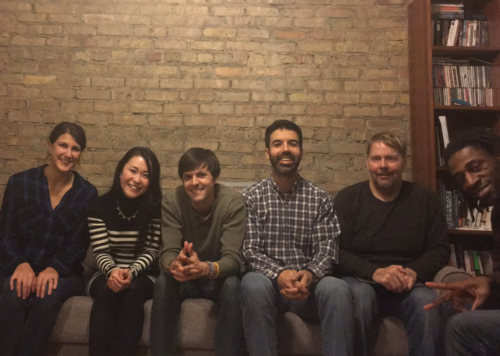Apropos of plugging my Japanese reading group, here is a translation of ケーベル先生の告別, which we read this month:
Koeber-sensei’s Farewell
Natsume SōsekiKoeber-sensei is supposed to be leaving Japan today (August 12). But he probably hasn’t been in Tokyo for two or three days now. Sensei is a strong willed person who hates empty ceremony and formalities. I heard that when he left Germany at the invitation of a university here twenty years ago, not a single person who knew him went to the station to see him off. He arrived in Japan quietly, like a shadow, and it seems he plans to leave Japan secretly, again like a shadow.
This quiet man moved three times in Tokyo. He was probably only familiar with those three houses and the ways to get to school from them. A while back, I asked him if he went walking, and he answered no, I have no place to go walking, so I don’t. He was of the opinion that the city was not a place for walking.
Sensei didn’t need to learn anything about Japan. Nor did he ever have the curiosity to try to learn anything. He was such that when I told him I was living in Waseda, he said he didn’t know his way to Waseda. Even after Fukada-kun reminded him that he had been invited to Count Ōkuma’s house in the past, Sensei had already forgotten. That might have even been the first time he heard Count Ōkuma’s name. [Count Ōkuma was the founder of Waseda]
When I took an invitation to dinner last month on the fifteenth, I asked him if he would have friends when he returned to his country, and he responded that, other than the North and South Poles, he had friends wherever else he went. This was a joke, of course, but Sensei could make this response precisely because somewhere deep inside his head there lurks an international mindset that transcends the trivial notion of place. And precisely because he could make such a response, he never needed to scowl despite living for twenty long years in Japan, a place about which he had little interest.
And it wasn’t just place; Sensei had a completely different attitude toward time than normal people. When I asked him why he had chosen to go on a steamer from a shipping company even though it was slow because half of the ship was filled with cargo, he said that he wouldn’t be bothered floating at sea for a long time nor could he understand someone so wrapped up in thoughts of convenience, trying to hasten their trip by a single day and get from Japan to Berlin in fifteen days or fourteen days.
He was also so indifferent to money that he didn’t seem like a Westerner at all. People who had visited Sensei’s home said that, from an economical point of view, he seemed to have been given a freedom that you couldn’t find in normal houses. When I last met him, the subject of a certain wealthy man came up, and he smirked and asked what exactly he planned to do by saving up all that money. Sensei will live off of a pension from the Japanese government and what is left of his pay to this point, but the amount left from his pay is truly a natural remainder and not the result of any foresight on his part.
The thing that mattered most to this man who lived in this way was just the love and affection that connected people. Sensei seemed to be fondest of the Japanese students he taught. On the night of the fifteenth when I was getting ready to leave his house and go home, he asked me to write the simple message “Farewell, be well” for him on his leaving Japan to his friends, especially his students that he had taught, in the Asahi Shimbun newspaper. Sensei didn’t want to write anything other than that. He didn’t need to say anything else. And he didn’t want the message to be placed into the classified section. Owing to circumstances, I received Sensei’s permission and carefully added my own words (superfluous though they may be) to his “Farewell, be well” so that the many people who received his teaching would see his farewell message, as he wished. And on behalf of those many people, I pray he has a safe voyage and a pleasant rest of his life.
It’s a nice little piece of writing. The sympathy toward Cable-sensei certainly seems to change over the course of the profile. There’s one other, longer, piece up on Aozora about Koeber-sensei. I’ll have to give it a read at some point.
But not in February! February we read Dasai Osamu’s 春. If you’re in Chicago, please join us:

